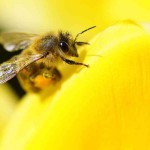 Researchers at Arizona State University have identified connections between sugar sensitivity, diabetic physiology and carbohydrate metabolism through studying the genetics of honey bees. Humans and honey bees may in part share these connections. The researchers were able to inactivate two genes in the bees’ “master regulator” module for the first time. The genes are involved in controlling food-related behaviors. The genes inactivated were called vitellogenin, which is similar to a human gene known as apolipoprotein B, and ultraspiracle, which has some functions in common with the human thyroid hormone.
Researchers at Arizona State University have identified connections between sugar sensitivity, diabetic physiology and carbohydrate metabolism through studying the genetics of honey bees. Humans and honey bees may in part share these connections. The researchers were able to inactivate two genes in the bees’ “master regulator” module for the first time. The genes are involved in controlling food-related behaviors. The genes inactivated were called vitellogenin, which is similar to a human gene known as apolipoprotein B, and ultraspiracle, which has some functions in common with the human thyroid hormone.
The researchers found a potential molecular link between sweet taste perception and the state of internal energy. The key finding was that by suppressing these two genes, bees can become more sensitive to sweet taste. They now want to find out how exactly, the bees’ sweet taste was enhanced by the experiment. The answer may be found in the fat body: the bee’s most metabolically active tissue. The fat body of a bee is similar to the liver and abdominal fat in humans, because it assists in storing nutrients and creating energy. For all animals, humans included, it is essential that taste perception communicates properly with the internal energetic state to control food intake and maintain normal life functions. Without proper communication, poorly functioning taste perception can lead to unhealthy eating behaviors, obesity and diabetes.
Related Reading:
A study published last year found that some people are better at tasting fat than others. Researchers reported that people who are not able to “taste” the fat in foods are likely to over-eat these foods, and are more likely to be overweight or obese. You can read more about the research here.






Weight Loss Studies & Clinical